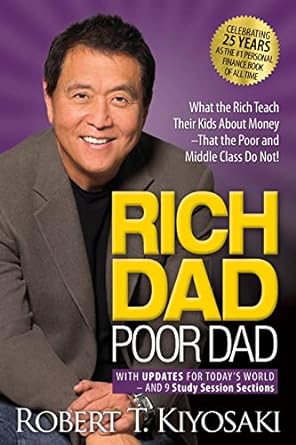"Rich Dad, Poor Dad"

Review of ‘Rich Dad Poor Dad’
 Hey there, fellow students! Today, we're diving into a book that's
been making waves in the money world for years. It's a pretty famous
one, written by Robert Kiyosaki, and it's all about two different
approaches to money and success. Don't worry, I'll break it down for
you in plain English, because let's face it - we've got enough
complicated reading to do for classes!.
Hey there, fellow students! Today, we're diving into a book that's
been making waves in the money world for years. It's a pretty famous
one, written by Robert Kiyosaki, and it's all about two different
approaches to money and success. Don't worry, I'll break it down for
you in plain English, because let's face it - we've got enough
complicated reading to do for classes!.
The author tells us about growing up with two father
figures. One was his actual dad - a well-educated guy who always
seemed to be struggling with money despite his smarts and hard work.
The other was his best friend's dad - a man who didn't have much
formal education but was seriously loaded.
Throughout the book, we get to learn the money lessons the author picked up from both of these men, with a focus on the wealthier dad's unconventional wisdom.
Now, let's chat about some of the main ideas this book throws at us:
First up, there's this mind-bending concept that having a lot of money
doesn't necessarily make you rich. I know, it sounds crazy, right? But
hear me out. The author argues that it's not about how much you earn,
but how much you keep and how you use it. It's all about managing your
cash flow, which is something we college students could probably use
some help with!
Another cool idea from the book is the concept of working to learn, not just to earn. Instead of focusing solely on landing the highest-paying job right out of college, the author suggests gaining skills and knowledge that will pay off big time later in life. This one really resonates with me - I mean, isn't that partly why we're in college?
The book also encourages readers to "mind their own business." No, the author isn't being rude! He's suggesting that we start thinking like entrepreneurs, even if we have regular jobs. It's about creating sources of income outside of your day job, which could be a game-changer.
In conclusion, this book offers a fresh take on money matters that
could spark some serious thoughts about your financial future. It's
definitely got me thinking about how I approach money, savings, and my
future career.
What do you think? Have you read this book?
Do you agree with these ideas, or do you have a different take? I'd
love to hear your thoughts! Drop a comment below and let's get a
discussion going. After all, talking about money doesn't have to be
taboo - the more we share and learn from each other, the better off
we'll all be!